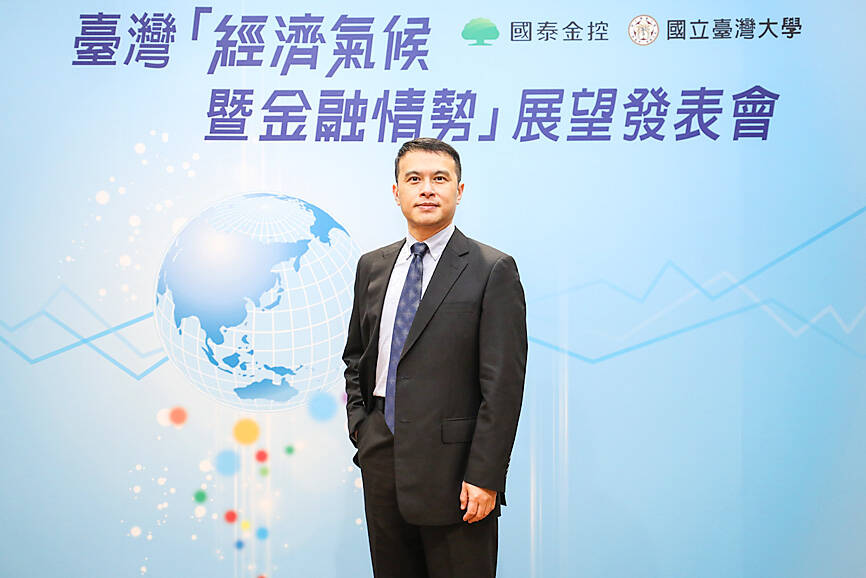Taiwan faces stagflation risk as economic growth this year is expected to slow while inflation remains high, Cathay Financial Holding Co (國泰金控) said yesterday.
A research team commissioned by Cathay Financial said that GDP this year would rise 1.8 percent year-on-year, down from its previous estimate of 2.3 percent, given weaker global demand.
The team, headed by National Central University economics professor Hsu Chih-chiang (徐之強), forecast that inflation would increase 2 percent this year.

Photo courtesy of Cathay Financial Holding Co
“This year’s GDP growth could be slower than inflation, which could be a sign of stagflation,” Hsu told a news conference in Taipei.
Although there is no strict definition of stagflation in which slow economic growth and high inflation coexist, Hsu said what worries them most is that this year’s projected GDP growth of 1.8 percent would be only half of the average growth of 3.6 percent over the past 12 years, while a forecast inflation of 2 percent would be double the average of 1 percent over the same period.
Taiwan’s GDP contracted 0.41 percent annually last quarter and is predicted to fall 1.2 percent this quarter, the Directorate-General of Budget, Accounting and Statistics has said.
If Taiwan enters stagflation, it would be the worst since the 2008 global financial crisis, Hsu said.
In the past, policymakers lowered interest rates to address stagflation, but such an approach would not work when inflation is severe, Cathay Financial economic research department assistant manager Achilles Chen (陳欽奇) said.
With high inflation persisting, the central bank is unlikely to cut rates anytime soon, Hsu said.
The research team predicted that the central bank would raise rates again in the second or third quarter following a 0.125 percentage point hike last week, he said.
“We think the central bank would address the inflation issue first and continue its rate hikes, despite slowing GDP growth,” Chen said.
Cathay Financial expects private consumption to drive the growth momentum this year, rising 4.3 percent this year, as people resume consumption after the COVID-19 pandemic.
The other three pillars of GDP — investment, government spending and net exports — could post slower growth, because of a high comparison base last year and sluggish global demand, the company said.

In Italy’s storied gold-making hubs, jewelers are reworking their designs to trim gold content as they race to blunt the effect of record prices and appeal to shoppers watching their budgets. Gold prices hit a record high on Thursday, surging near US$5,600 an ounce, more than double a year ago as geopolitical concerns and jitters over trade pushed investors toward the safe-haven asset. The rally is putting undue pressure on small artisans as they face mounting demands from customers, including international brands, to produce cheaper items, from signature pieces to wedding rings, according to interviews with four independent jewelers in Italy’s main

Japanese Prime Minister Sanae Takaichi has talked up the benefits of a weaker yen in a campaign speech, adopting a tone at odds with her finance ministry, which has refused to rule out any options to counter excessive foreign exchange volatility. Takaichi later softened her stance, saying she did not have a preference for the yen’s direction. “People say the weak yen is bad right now, but for export industries, it’s a major opportunity,” Takaichi said on Saturday at a rally for Liberal Democratic Party candidate Daishiro Yamagiwa in Kanagawa Prefecture ahead of a snap election on Sunday. “Whether it’s selling food or

CONCERNS: Tech companies investing in AI businesses that purchase their products have raised questions among investors that they are artificially propping up demand Nvidia Corp chief executive officer Jensen Huang (黃仁勳) on Saturday said that the company would be participating in OpenAI’s latest funding round, describing it as potentially “the largest investment we’ve ever made.” “We will invest a great deal of money,” Huang told reporters while visiting Taipei. “I believe in OpenAI. The work that they do is incredible. They’re one of the most consequential companies of our time.” Huang did not say exactly how much Nvidia might contribute, but described the investment as “huge.” “Let Sam announce how much he’s going to raise — it’s for him to decide,” Huang said, referring to OpenAI

The global server market is expected to grow 12.8 percent annually this year, with artificial intelligence (AI) servers projected to account for 16.5 percent, driven by continued investment in AI infrastructure by major cloud service providers (CSPs), market researcher TrendForce Corp (集邦科技) said yesterday. Global AI server shipments this year are expected to increase 28 percent year-on-year to more than 2.7 million units, driven by sustained demand from CSPs and government sovereign cloud projects, TrendForce analyst Frank Kung (龔明德) told the Taipei Times. Demand for GPU-based AI servers, including Nvidia Corp’s GB and Vera Rubin rack systems, is expected to remain high,